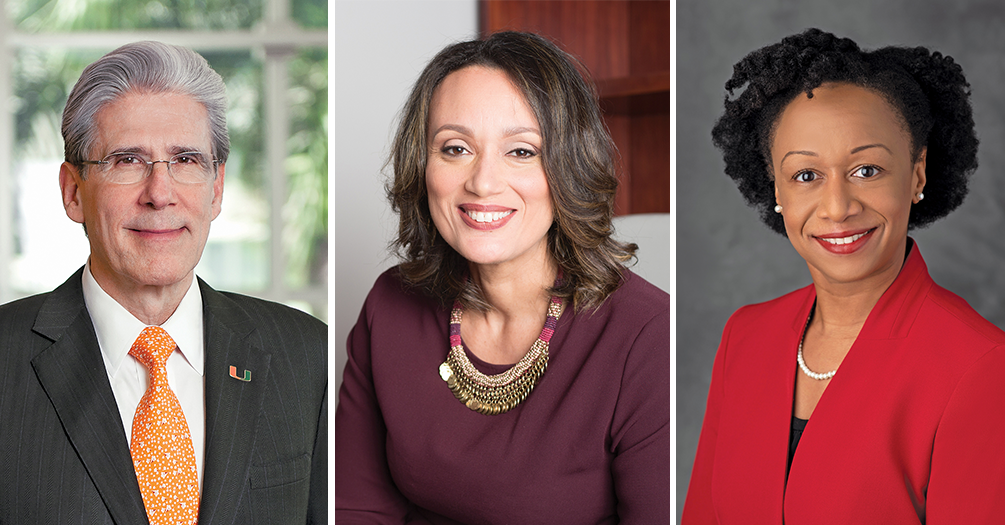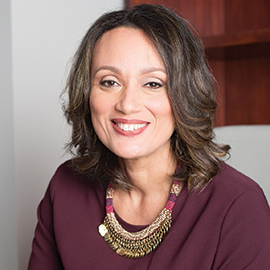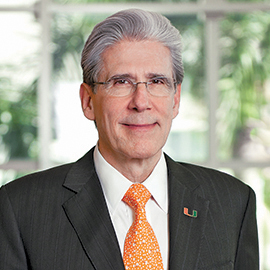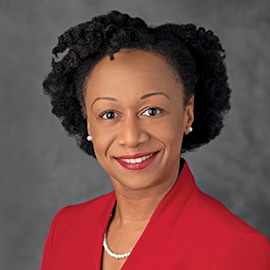Ahead of the Curve: A New Speaker Series from the University of Michigan School of Public Health

Julio Frenk, MPH ’81, PhD ’83, Tonya Allen, MPH/MSW ’96, Joneigh Khaldun, BS ’02
Bringing contemporary leaders to share their insights, vision, and perseverance is the principle of Ahead of the Curve, a new speaker series from the University of Michigan School of Public Health. The series launched in the fall of 2020 with a focus on personal storytelling from dynamic leaders during a pandemic and beyond. All events are free and open to the public. The following excerpts from the first three events show the scope and depth of the series.
Resilient Leadership in a Dynamic World

Tonya Allen served for years as president and chief executive officer of Detroit’s Skillman Foundation and recently became president of the McKnight Foundation in Minneapolis. Her career has centered on pursuing, executing, and investing in ideas that increase opportunities for people of color and those living in under-resourced communities.
Leadership is not about an individual person doing a great thing. It’s about how that person enables other people to do great things. Having a selfless approach to leadership doesn’t mean you’re weak. It doesn’t mean you’re not confident. It means you’re actually bold and confident enough that you don’t have to have credit for the impact of your leadership.
As an African American woman, I often say that I will lead like an African American woman. If we don’t lead from our lived experiences and from our diversity, we’re not really showing the full breadth of what leadership looks like. If we believe that diverse leadership matters, then we actually need to show what diversity of leadership looks like. If I simply mimic the way I see white men lead, then I’m not actually bringing diversity to my leadership. I’m bringing physical diversity but not leadership diversity. I try to bring my whole self into that conversation and be comfortable
Having a selfless approach to leadership doesn’t mean you’re weak. It doesn’t mean you’re not confident. It means you’re actually bold and confident enough that you don’t have to have credit for the impact of your leadership.
–Tonya Allen, MPH/MSW ’96
Diversity is an advantage. We need diversity of thought, which is not about where you stand on politics but about differences in your professional training and whether you even have professional training. Differences in your lived experiences. Differences in how you view the world because of your race or the color of your skin. The ways you’ve had to navigate the world. You might see something differently than other people will, and you might value assets in ways other people don’t.
Leadership to Inspire Global Change

A fourth-generation physician whose paternal grandparents fled Germany in the early 1930s to build a new life in Mexico, Julio Frenk catalyzed his deep gratitude for the kindness of strangers into a lifelong mission to improve the health, education, and well-being of people around the world. Dr. Frenk currently serves as president of the University of Miami. He began his presidency in August of 2015 following nearly seven years as dean of the Harvard T.H. Chan School of Public Health.
When we as humans connect to something that transcends us, we really fulfill our sense of mission and sense of legacy, of leaving something behind. We are here for a limited period of time, and to me the idea of legacy is the cornerstone of leadership. It’s thinking rigorously, “what do I want to leave behind when I am gone?”
I had six years to be Secretary of Health in Mexico. I started thinking on day one how I could ensure that I leave things behind better than the way I received it. Being purposeful and understanding that legacy is fundamental and that we always build legacies with others. And being able to communicate persuasively about legacy is critical.
If we can align enlightened self-interest with generosity and compassion, then we have a very powerful formula for addressing crises.
–Julio Frenk, MPH ’81, PhD ’83
If there’s one lesson we need to convey persuasively, it is connecting people to something bigger. It also happens to be the best way to protect yourself. My own health is hugely dependent on what I do for other people’s health, and nowhere is this more obvious than with infectious diseases.
If we can align enlightened self-interest with generosity and compassion, then we have a very powerful formula for addressing crises.
Lessons from a Pandemic: Leading with Science

Joneigh S. Khaldun, MD, MPH, is chief medical executive for the State of Michigan and chief deputy director for Health in the Michigan Department of Health and Human Services. She is adjunct professor of Health Management and Policy at the School of Public Health and, as an undergraduate student at Michigan, completed the University of Michigan Summer Enrichment Program.
Since well before the pandemic, my epidemiology team knew that when we look at data, we will always look at it by race and ethnicity as best we can.
We were one of the first states to look at COVID-19 cases and deaths by race and ethnicity. And we found stark disparities—African Americans are 14% of Michigan’s population and accounted for 40% of COVID deaths.
We looked at that data, then worked with the governor to put it into action. We formed a racial disparities task force. We brought together community members so we’re not sitting in a bubble as leaders but are engaging the community.
People are paying attention to disparities more now than before COVID-19. But I am concerned that when COVID-19 goes away, people will forget the tragedy that’s played out with inequities in black and brown communities.
—Joneigh S. Khaldun, BS ’02
We implemented policies that put money and other resources into communities of color—masks, testing, communication efforts so people knew the risks and what to do. And we were able to bring that disparity down.
People are paying attention to disparities more now than before COVID-19. But I am concerned that when COVID-19 goes away, people will forget the tragedy that’s played out with inequities in black and brown communities.
Find upcoming Ahead of the Curve events and watch or listen to all past events.
- Interested in public health? Learn more today.
- Read Good Science Changes: That’s a Good Thing in this issue of Findings.
- Support research and engaged learning at Michigan Public Health.
